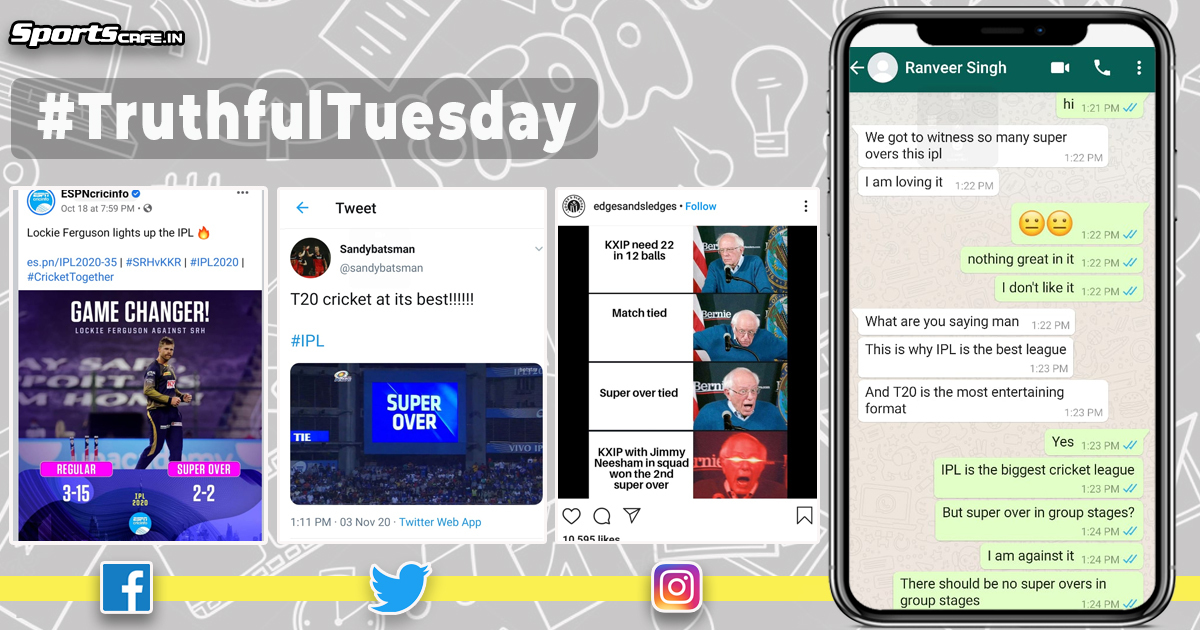Truthful Tuesday | IPL needs to do away with Super Overs for group matches

Truthful Tuesday | IPL needs to do away with Super Overs for group matches
|SportsCafe
St. James’ Park, 2011. Arsenal are 4-0 up against Newcastle United inside the first 26 minutes. For the Magpies, the game looks fated to be a forgettable and hideous drubbing, but an Abou Diaby red-card in the 50th minute opens the door for a comeback. Slightly.
20 minutes later, Arsenal concedes two silly penalties, which Joey Barton scores and a thumping Leon Best finish in the 75th minute brings Newcastle within touching distance. 4-3. 12 minutes of agony and anxiety ensues for both sides before in minute 87, Cheick Tioté scores the goal of his life to level the scores. Rapture. Ecstasy. Euphoria.
Newcastle and Tiote think they’ve pulled off the most remarkable and astonishing underdog comeback in Premier League history - except they haven’t. The game goes to a penalty shootout which Arsenal win 3-1 and walk away with all 2 points to their name. What does Newcastle have to show for? Well, nothing.
It would have sucked if one day the FA had woken up and thought that draws shouldn’t exist in the Premier League, wouldn’t it?
Now, on the contrary, could you imagine how beautiful and refreshing it would be if the IPL organizers one day woke up and thought that Super Overs shouldn’t exist for group stages? Ishan Kishan would have a point to show for his valiant 99, the ‘one short’ umpiring blunder would have cost Kings XI one point and not two and Chris Jordan would have been punished for his stupidity of trying to run a marathon in a 100-metre sprint.
Super Overs are fun and no one can deny it. It is one of the fairer tie-breakers that exist across sport, the skill level involved is off the charts and the fun and frenzy invoked by the concept is easily unmatched. It is the Super Over(s) that turned a very good KXIP vs MI encounter into arguably the greatest T20 match of all time and the 12-ball shootout gives closure to games that deserve one. But if this IPL 2020 season has taught us one thing, it’s that Super Overs should not exist for Round Robin matches.
The argument here is simple: by rushing to settle matters via a Super Over, you are demeaning the efforts put in by the players across 40 overs of normal time and are unfairly rewarding one side. Take the Mumbai versus Bangalore encounter in Dubai earlier this season, for instance. At 112/4 in the 14th over, Mumbai had no business even remotely coming close to the target of 202. Yet they did. Both Kishan and Pollard beat the odds and, through their unflinching belief, did the impossible and tied the scores. But alas, all they had to show for their efforts were just tweets from fans and praises from Commentators. Ultimately, their efforts were rendered useless thanks to RCB winning the Super Over, and what they got in return for their efforts was zilch.
Now the counter-argument would be, “Well, they knew there was a Super Over. They didn’t get the job done and so they deserved to walk away with no points.” This is true. For 12 balls after normal time, Mumbai held their fate in their own hands and could very well have made 120 balls of blood, sweat and tears not go in vain. Ultimately, it was them - who bottled the opportunity to secure two points. However, it is only fair that teams aren’t put in such precarious, life-or-death situations in the first place.
Cricket, for starters, is not a binary win-loss knockout sport like Tennis: ties have existed since the inception of the game. But while a tie-breaker like a Super Over can and must be utilized to decide the winner in a knockout encounter - where there is an intrinsic need for one team to progress - there is no real necessity to do the same in the group stages. The move to have Super Overs in group stages is less of a cricketing move and more of a commercial gimmick to cater to the ‘instant gratification’ needs of the fans - not only does a Super Over ensure an outright winner, but the inherent nature of the concept assures more entertainment and adds to the thrill of the competition and value of the brand. Lost in this process, however, are the efforts of a set of players and wiped away is a glorious, poetic and feel-good phenomenon that has made the sport what it is: comebacks.
In a two-month-long, eight-team competition like the IPL where each side plays no less than 14 games per head, it is okay to have ties; they will not, by any stretch of the imagination, degrade the quality, nor will they serve as a buzz-kill. What ties will, instead, manage is bring parity and reward sides for what they managed to achieve over the course of 40 overs. Did Bangalore deserve to walk away with two points that night versus the Mumbai Indians? Absolutely not. Why? Because, ultimately, they did not cross the finish line. But so did Mumbai, thus, logically and pragmatically, the just and even-handed solution would be to hand both sides one point each.
By introducing a Super Over, however, all you’re managing to achieve is unreasonably and unnecessarily reward one side, based on a 12-ball shootout, when there is no clear reason to do so. Team sports and stalemates go hand-in-hand - not every match needs to have a clear cut winner; not every match is a final. If you fail to get the job done in the allotted time? One point is all you deserve; nothing more, nothing less.
Would you, as a fan, have a 100% assurance of your team walking away with one point, for all the effort the players have put in across 3 hours, or risk a 50% probability of them going home empty-handed? Put yourself in the shoes of a Newcastle fan and transport yourself back to St. James’ Park, 2011, before you answer.
